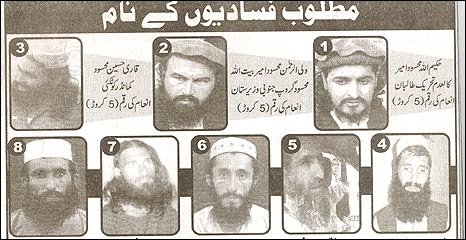|
|
|
Eight South Waziristan Taliban commanders, pictured in a wanted poster: 1. Hakeemullah Mehsud, 2. Waliur Rehman Mehsud, 3. Qari Hussain Mehsud, 4. Azam Tariq, 5. Maulvi Azmatullah, 6. Mufti Noor Wali, 7. Asmatullah Bhittani, 8. Mohammad Anwar Gandapur. |
A commander in the Movement of the Taliban in Pakistan said his followers carried out last weekend’s deadly suicide attack against a Shia religious procession in Karachi that killed 43 people and wounded more than 100.
Asmatullah Bhittani, who also goes by the name Shaheen, said one of his men carried out the suicide attack and that more strikes have been planned.
“My group claims responsibility for the Karachi attack and we will carry out more such attacks, within 10 days,” Asmatullah told Reuters.
“[T]he (the suicide bomber) was our man; his name was Hasnain Muawia and we did it to protect the honour of the companions of the holy prophet,” Asmatullah said. “We will carry out more such attacks and also target government installations.”
Asmatullah is among the 20 most-wanted Taliban commanders operating in South Waziristan, Tank, and Dera Ismail Khan. He is a military commander in the towns of Jandola and Tank in the district of Tank and reports to Hakeemullah Mehsud, the leader of the Movement of the Taliban in Pakistan. The Pakistani government has placed a $120,000 bounty on his head.
Only one of the wanted Taliban commanders has been captured since the Army started its offensive in the Mehsud tribal areas in South Waziristan. The Taliban have fled to North Waziristan, Arakzai, Kurram, Khyber, and to areas in South Waziristan that are under the control of Mullah Nazir.
The Taliban likely teamed up with the Lashkar-e-Jhangvi, a radical anti-Shia group that has allied with al Qaeda and the Taliban, to carry out the Dec. 28 suicide attack. Lashkar-e-Jhangvi has a strong presence in Karachi and views Shia as apostates.
The Dec. 28 attack is the largest in Karachi since the Oct. 17 suicide attack that targeted former Prime Minister Benazir Bhutto just hours after she touched down in the country following an eight-year exile. Bhutto survived that attempt but was killed two months later in a suicide and shooting attack in Rawalpindi.
The Taliban has carried out dozens of suicide attacks and assaults against military and civilian targets throughout the country since it announced its offensive on Oct. 5. Tribal leaders raising ant-Taliban lashkars, or militias, in the tribal areas and the northwest have also been heavily targeted. More than 650 Pakistanis have been killed in the attacks.








